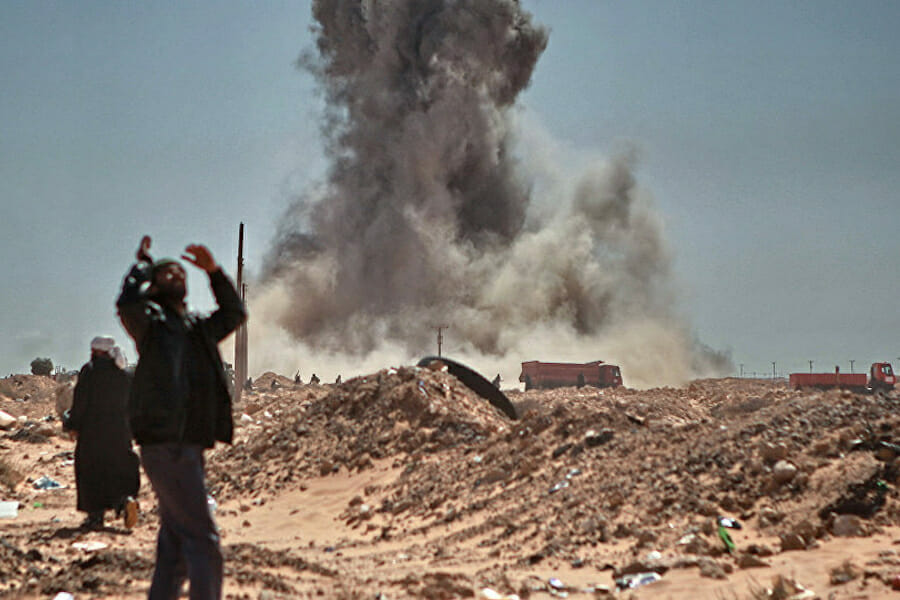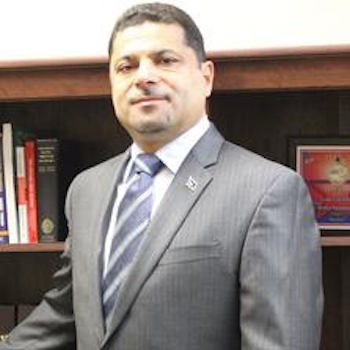
How a Swiss NGO Is Helping Create a Police State in Libya
Is the UN committed to a unified and democratic Libya?
This article will show how the current plan for Libya is anything but a “Libyan-Libyan” solution, as the UN has claimed. The evidence for this assertion lies in the document serving as a foundation for this process, “The Libyan National Conference Process: Final Report.” This document is methodologically flawed, and biased towards a specific outcome. These flaws are not innocent mistakes, however, but reveal a calculated attempt to ensure Libya develops according to the policy preferences of non-Libyan actors using Libyans as proxies. The war in Libya, in other words, is no longer about Libyans.
The current UN plan for Libya is the brainchild of UN envoy Ghassan Salamé. Salamé commissioned the Centre for Humanitarian Dialogue (“HD”) to conduct a national survey to discern the will of the Libyan people regarding critical political, military, and social issues. Salamé hailed HD’s Final Report as a “national referendum” and boasted about its 1.8 million participants.
Salamé originally planned to have the results of this survey form the foundation for the objectives and strategy of the Libyan National Conference that was to be held in Gadamis last year. However, when Khalifa Haftar’s attack on Tripoli prevented the Gadamis conference from taking place, Salamé came up with another plan: Hold meetings in Geneva under the supervision of HD, to chart the way forward and make recommendations that would be supported by Security Council resolutions. That is where we are today.
The geopolitical agenda promoted by the HD report is clear, and its methodological flaws underscore how the report is not what it appears to be—a scientific survey. It is, in fact, a whitewash. Let us first consider the significance of its findings and recommendations—and read between the lines— then we will look at its methodological failings.
In terms of the findings and recommendations, the report promotes the false narrative that what is happening in Libya is a dispute over resources. Instead of acknowledging that the war is about democracy and freedom—between a side that seeks to bring autocracy back and a side that is trying to be faithful to the revolution and hold elections. The “economic dispute” narrative offers a fig leaf to Haftar and his backers, and makes both sides look equally guilty, or innocent, the real challenge being how to distribute resources equitably.
Throughout the report, there are not-so-subtle indications of an anti-democratic and pro-military bias. Incredibly, the report presents the formation of “military administrators” for Libya’s separate regions as a legitimate option suggested by “some” of the participants. This recommendation echoes Haftar’s practice of removing elected officials and appointing military governors in their stead, in areas under his control.
The report details how “some participants” called for building trust between the military institutions in the east and west. This “trust building” concept is code for legitimizing the eastern forces of Haftar, and gives militia groups in all regions of Libya equal legitimacy. However, this recommendation is more dangerous than that. Salamé considers the LNA as a legitimate fighting force, and a genuine military institution. In contrast, most of the fighting forces in the west are considered militia groups. Inevitably, such a recommendation would serve Haftar’s interests.
The HD report also contains recommendations that “units in the east should form the nucleus of Libya’s professional armed forces.” The units in the east are Haftar’s units who committed numerous war crimes, and include individuals wanted by the International Criminal Court. Even more indicative of the report’s true leanings is the call for forming a National Council of Defense and Security. President Sisi of Egypt, one of Haftar’s regional supporters, uses a similar institution to effectively run the entire country, side-stepping most of its government, including key economic institutions.
As Libyans know first-hand, only a strongman can control and benefit from such formations. Indeed, Qaddafi split the country into military and security regions with each sector watching the other and plotting against it.
As another ill-conceived attempt to strip power from a future central government and militarize the nation further, even small municipalities will be tasked with forming their own “regional armed forces.” The “national survey” suggests that the majority of participants argued that hundreds of regional armed forces may be formed under the direction of municipality officials who have no experience with security, defense, or military matters.
On top of these outlandish recommendations, the survey participants supposedly call for municipalities to be “purely service-oriented and isolated from political battles.” It is clear, therefore, that the report seeks to desensitize the public to the menace of forming regional armed forces, regions which would appear to be under the control of municipalities while in reality would serve the purpose of Libya’s new dictator to exert control, fear, and tyranny.
HD claims that participants in the survey called for the distribution of national wealth according to the geography where resources are located. This recommendation serves Salamé’s recent narrative that the war in Libya is about resources and wealth. His position emboldened pro-Haftar tribal leaders to assert their “rights” to oil, gas and even water that flows under “their lands.” A few weeks ago these tribal leaders shut off all of Libya’s gas and oil output citing exactly the narrative in the HD report as the underlying justification for their actions.
The war has witnessed a series of well-publicized widespread and systematic war crimes, including denying of quarter, blockades of civilians, summary executions, and wide-spread random bombardment. Despite the plentiful evidence, this subject was never broached in the report. Moreover, the survey participants called for a general pardon for the period of the conflict. HD and Salamé are offering war criminals a way out of responsibility and a way towards absolute power over the country.
The survey also presents the “non-electoral exit from transition until the task of state-building is complete” as a valid input from the participants. This suggestion mirrors Khalifa Haftar’s position as articulated by the former U.S. envoy Jonathan Winer who tweeted about his meetings with Haftar: “He was not willing to subordinate himself to any civilian govt, or to anyone else, period. He said he would rule by decree until Libya was ready for democracy at some future date.”
The above examples represent only a part of the agenda buried in this seemingly innocent report. Now to some of the methodological failings, the existence of which is further proof that this foundational document is not valid as the voice of the Libyan people. Salamé’s attempt to pass this unverifiable survey as a national referendum is an affront to the Libyan people, international standards, and the United Nations’ own requirements, such as the Venice Commission’s Code of Good Practice on Referendums. The report is in total violation of every such requirement.
Most glaringly, perhaps, is the fact that the study nowhere identifies the participants. There is no record of the age or citizenship status—or any other data relevant to the identity of participants, except geography (the report claims that all names and personal details were collected and recorded but none are included in the report). We simply do not know who participated in this survey elevated to the level of a referendum, given that 99.7% of participants were non-verifiable.
The number of participants according to geography seems to be totally uncorrelated to centers of population. For example, the population of Sebha is about 80,000 residents yet the city had 190 participants in workshops. Misrata, Libya’s third-largest city with a population of almost 600,000 had only 120 residents participate. It is no coincidence that Misrata is the hotbed of opposition to Haftar.
Furthermore, it is not clear what level of editing or censorship took place during the running and summarizing of meetings, both of which were carried out by “participants,” and not by HD staff: “These organizers moderated the events and produced reports of each meeting, summarizing the main recommendations.” The outsourcing of this central part of the report to the local participants is deeply problematic.
Many Libyan communities were beyond reach of these meetings for security or other reasons. Therefore, HD took to social media to fill in the gaps. The report indicates that comments on its Facebook postings were considered as part of the survey. This virtual participation was promoted as indicative of the wide reach of the survey. In reality, this supposed wide reach of the survey is exactly its weakness. According to Ruths and Pfeffer, “mounting evidence suggests that many of the forecasts and analyses being produced (by social media) misrepresent the real world.”
In the age of fake news, Internet fraud, and political manipulation on social media, the HD report took no precautions to protect its data collection from any Internet-related uncertainty. As detailed by Nathaniel Greenberg, head of the Arabic program at George Mason University: “Russian efforts to embed and normalize the consumption of Kremlin-based media in the digital ecosphere of the Arab world have been increasing for years. Of particular relevance is the parallel rise of Khalifa Haftar and Russian-backed media stories promoting him as the best defense against militant Islam, a narrative also pushed by Egypt, UAE, and Saudi Arabia.” Relying on the Internet activity for the report is, then, beyond naive.
Beyond questions about participants, another glaring flaw in the report is its total lack of statistical specificity. The report relied on vague adjectives to indicate agreement. For example, recommendations of participants were supported by “some” in over 109 instances, with “many” in 55 instances and “it was agreed” in 58 instances. Since HD could not verify the identity or the number of participants, it conveniently used such words that contradict the purpose of a survey as they mean unspecified and unknown things.
In an annex entitled, promisingly, “Methodology,” we find many vague statements which pertain more to the logistics of conducting such a survey and not to anything that social scientists would recognize as methodology: “As part of its mission to organize the consultative process meetings, (HD) formulated a series of guiding questions to facilitate dialogue among Libyans and form a systematic basis for the whole process.” There was no mention of how the questions which form the basis of the survey were created, and no mention of pretests or pilot surveys for this purpose, such as globally-recognized survey organizations like the Pew Foundation advocate. These would have enabled HD to hone their questions—arguably the most important part of the whole process.
The result of this paucity of methodological scaffolding and quantitative analysis is that the survey simply does not ring true. Instead, it presents politically correct vagaries and platitudes. It is difficult to imagine how the report could have reduced Libya’s divided nature to such homogeneity —unless, of course, the report had predetermined conclusions.
There is no doubt that if one reads the HD report one could find much to agree with. However, these and many more observations, are feel-good textbook political science clichés. In order to have real credibility, any such national-level report must be grounded in solid methodology, qualitative and quantitative analysis, and a research process that is truly inclusive, well-designed and effectively executed.
Libyans need honest and unbiased brokers to facilitate agreements and help the nation march towards democracy and freedom. HD’s report will clearly aid Salamé in his quest to recreate an autocratic police state in Libya. Salamé, who enjoyed extensive and deep financial and official ties to the UAE ruling family is no honest broker. HD has now taken the side of the UAE and Salamé. Libya needs to be saved from all three.
